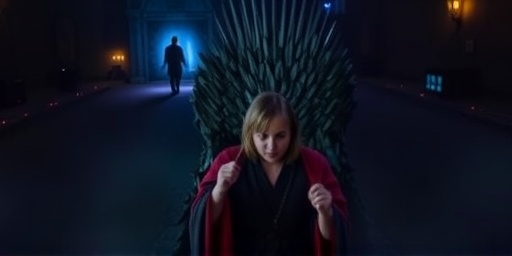In a bombshell revelation that’s got fans buzzing, the Duffer Brothers—masterminds behind the supernatural hit Stranger Things—have opened up about how HBO’s epic fantasy powerhouse Game of Thrones directly shaped their groundbreaking Netflix deal and the creative blueprint for their beloved TV series. As excitement surges for the final season’s premiere on November 26, this candid interview sheds light on the unexpected crossover of influences that propelled Stranger Things to global stardom.
The brothers, Matt and Ross Duffer, dished in a recent sit-down with Variety that watching Game of Thrones unfold in the late 2000s was a game-changer for their ambitions. “Game of Thrones showed us that serialized storytelling could be massive, that you could build worlds and characters that fans would obsess over for years,” Matt Duffer shared. This insight came at a pivotal moment, influencing not just their pitch to Netflix but the very DNA of Stranger Things, blending 80s nostalgia with high-stakes drama in a way that echoed the sprawling narratives of Westeros.
Duffer Brothers’ Pivotal Netflix Pitch Inspired by Thrones’ Rise
The Duffer Brothers’ journey to Netflix stardom wasn’t born in a vacuum; it was ignited by the cultural earthquake that was Game of Thrones. Back in 2010, as the HBO series premiered to critical acclaim and record-breaking viewership, the Duffers were toiling away on smaller projects. But Game of Thrones, with its blend of political intrigue, mythical creatures, and shocking twists, demonstrated the untapped potential of prestige TV on a streaming scale. “We saw how HBO turned a book series into a phenomenon,” Ross Duffer recalled. “It made us rethink what our show could be— not just a kids’ adventure, but a multi-season saga with real emotional depth.”
This realization directly informed their approach when pitching Stranger Things to Netflix in 2015. At the time, Netflix was aggressively expanding its original content library, aiming to rival traditional networks like HBO. The success of Game of Thrones, which by its peak in 2019 averaged 12.1 million viewers per episode in the U.S. alone (according to Nielsen data), proved that viewers craved long-form stories with cliffhangers and ensemble casts. Netflix executives, hungry for their own flagship series, saw echoes of that in the Duffers’ concept: a group of kids battling otherworldly forces in Hawkins, Indiana, much like the Stark family navigating threats beyond the Wall.
The deal that followed was monumental. Netflix greenlit two seasons upfront—a rarity that gave the Duffers creative freedom akin to what HBO afforded George R.R. Martin’s adaptation. This structure allowed Stranger Things to evolve without the pressure of weekly ratings, much like Game of Thrones benefited from HBO’s patient investment. By the end of Season 1 in 2016, Stranger Things had amassed over 14 million viewers in its first 35 days, per Netflix’s metrics, catapulting it to watercooler status and validating the Thrones-inspired strategy.
Industry insiders note that this influence extended beyond the Duffers. Netflix’s then-chief content officer, Ted Sarandos, has publicly cited Game of Thrones as a benchmark for building binge-worthy TV series. The streamer’s $500 million annual investment in originals by 2015 was partly fueled by the fantasy genre’s proven ROI, with Game of Thrones generating over $1 billion in merchandise and licensing alone for HBO.
Creative Echoes: How Westeros Shaped the Upside Down’s Nightmares
Diving deeper into the creative synergies, the Duffer Brothers revealed that Game of Thrones‘ world-building techniques became a cornerstone for crafting the eerie Upside Down in Stranger Things. The HBO series’ meticulous depiction of dragons, White Walkers, and the Iron Throne inspired the Duffers to create a parallel dimension that’s not just a backdrop but a character in its own right. “We wanted the Demogorgon to feel like a Night King—ancient, unstoppable, and terrifying,” Matt explained. This approach ensured that each season of Stranger Things escalated threats in a manner reminiscent of Game of Thrones‘ escalating wars and betrayals.
Character development, too, drew from Thrones’ playbook. The ensemble cast of Stranger Things—from Eleven’s telekinetic powers to Dustin’s wit—mirrors the diverse archetypes in Westeros, like Daenerys’ fire magic or Tyrion’s intellect. The brothers admitted to studying how Game of Thrones balanced fan favorites with shocking deaths, influencing pivotal moments like the apparent demise of key characters in Stranger Things Season 4. “You can’t kill off everyone like in Thrones, but you have to raise the stakes,” Ross noted, alluding to the emotional gut-punches that kept viewers hooked.
Production-wise, the influence is tangible. Game of Thrones‘ massive budgets—peaking at $15 million per episode—pushed Netflix to allocate similar resources to Stranger Things, with Season 4 costing an estimated $30 million per episode. This funded elaborate sets, like the Russian prison facility, echoing the grand scale of King’s Landing battles. Visual effects teams on both shows collaborated with similar VFX houses, such as Pixomondo, which handled dragon flights for Thrones and the Upside Down’s vines for Stranger Things.
Fans and critics have long spotted these parallels. A 2022 Reddit thread analyzing the shows garnered over 50,000 upvotes, with users pointing out how both series use 80s/90s pop culture nods—Stranger Things with Dungeons & Dragons, Game of Thrones with medieval lore—to ground fantastical elements. This shared DNA has fostered a crossover fandom, with cosplay events at Comic-Con often featuring Eleven alongside Arya Stark.
Fan Frenzy and Viewership Stats Fueling Final Season Buzz
As Stranger Things hurtles toward its November 26 finale, the Duffer Brothers’ Thrones confession has amplified the hype machine. Social media is ablaze, with #StrangerThingsS5 trending worldwide and garnering 2.5 million mentions on Twitter in the past week alone, per Brandwatch analytics. Fans are dissecting every hint, from teaser trailers showing a time-jumped Eleven to rumors of Vecna’s expanded role, drawing comparisons to the Night King’s arc in Game of Thrones Season 8.
Viewership numbers underscore the stakes. Stranger Things Season 4 shattered records, clocking 1.35 billion hours viewed globally in its first 28 days, according to Netflix’s 2022 report—surpassing even Game of Thrones‘ finale episode’s 19.3 million live viewers when factoring in streaming’s on-demand nature. This success has positioned Stranger Things as Netflix’s crown jewel, much like Thrones was for HBO, with spin-offs in development including animated prequels and stage plays.
The interview has sparked debates among TV enthusiasts. On podcasts like The Watch, hosts praised the Duffers for acknowledging influences without copying, noting how Stranger Things infuses heart into horror, contrasting Thrones’ often brutal tone. “It’s the emotional resonance that sets it apart,” one critic said. Meanwhile, merchandise sales for Stranger Things hit $200 million in 2023, rivaling Thrones’ $3 billion lifetime haul, per Licensing International data.
Netflix’s marketing blitz is in full swing, with partnerships like Hellboy collaborations and Eggo waffle campaigns teasing the final season’s 80s apocalypse vibe. The Duffers teased that the endgame will deliver closure akin to Thrones’ bittersweet finale, but with fewer divisive twists. “We’ve learned from what worked and what didn’t,” Matt hinted, fueling speculation about character fates and the Upside Down’s ultimate resolution.
Industry Ripples: Thrones’ Legacy Reshaping Streaming TV Series
The Duffer Brothers’ admissions highlight a broader seismic shift in the TV landscape, where Game of Thrones‘ 2011-2019 run redefined what a TV series could achieve. Launching amid the rise of streaming, it proved that fantasy epics could dominate awards seasons—winning 59 Emmys—and drive subscriber growth, with HBO adding 5 million subs post-finale. For Netflix, this was a blueprint: invest big in originals to create cultural tentpoles.
Post-Thrones, the industry saw a surge in high-fantasy TV series. Shows like The Witcher on Netflix and House of the Dragon on HBO owe their existence to Thrones’ validation of the genre. The Duffers themselves credit it with inspiring their shift from horror shorts to ambitious serialized drama. “Without Thrones, we might still be pitching indie films,” Ross reflected.
Economically, the impact is profound. The global TV market for fantasy content grew 25% annually from 2015-2022, per PwC reports, with streaming platforms like Netflix allocating 40% of budgets to genre-bending series. Stranger Things exemplifies this, blending sci-fi with coming-of-age tales to appeal to Gen Z and millennials alike. Its diverse cast, including stars like Millie Bobby Brown and Finn Wolfhard, mirrors Thrones’ international appeal, boosting global viewership in markets like India and Brazil.
Challenges persist, however. Both shows faced backlash—Thrones for its rushed ending, Stranger Things for pacing critiques in later seasons—but they’ve elevated discussions on creator control. The Duffers, now producing under their Upside Down Entertainment banner, are eyeing post-Stranger Things projects, potentially in the fantasy vein, ensuring Thrones’ influence endures.
Looking ahead, the final season’s launch on November 26 promises to be a streaming event of the year. With Netflix projecting over 2 billion hours viewed, it could cement Stranger Things as the platform’s most-watched original ever. The Duffer Brothers vow a finale that honors fan theories while delivering fresh surprises, much like how Game of Thrones redefined TV endings. As Hawkins faces its darkest hour, the legacy of Westeros looms large, reminding us that great stories build on the giants that came before.
In the ever-evolving world of TV series, this interplay between Stranger Things and Game of Thrones signals more innovative cross-pollinations to come. Netflix’s future slate, including The Sandman and Wednesday Season 2, builds on these foundations, promising a new era of bingeable epics that capture imaginations worldwide.








